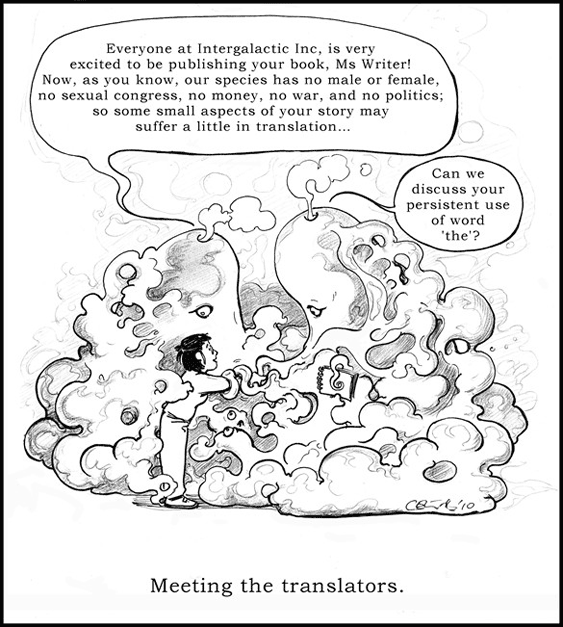Translating translations
This is a sincere hymn of praise to my wonderful German translator Astrid Finke. She has, at one stage or another, discussed all the following things with me (and many more) I’m unbelievably lucky to have found her.
When I was asked to address the 2008 international translator’s conference in Dublin, I was quietly convinced that they’d invited the wrong Celine Kiernan by mistake. You could have coloured me surprised when I learned that it was because The Moorehawke Trilogy is considered a bit of a challenge translation-wise, and they wanted to hear the thought processes behind my often rather quirky use of language.
Meeting with that intelligent, dedicated and talented group of people has quite honestly been one of the major highlights of my publishing experience. It was such a thrill and a pleasure to understand that they were excited to deal with the challenges my work presents, that to them this was not just a pain in their very busy, underpaid and chronically underappreciated butts – but a chance to stretch their muscles, and an opportunity to do the very thing that all wordsmiths love: play with language.
One of the most important things I took home from this conference, was the understanding that translations simply cannot be done without communication between author and translator. It shocked me to discover that this communication often just doesn’t happen. The translators told me that very often their authors simply aren’t available to them, and I have since spoken to quite a few authors who never heard from their translators at all. Crazy, I say! Nuts! In this age of e-mail and (gasp!) international phone lines, there’s no real reason an author can’t be available to answer a few questions. If left unanswered, those few questions could mean the loss of a whole layer of meaning, which had previously been conveyed through the author’s very careful choice of words or tone.
Take these two simple examples from Moorehawke:
The choice of the name Loups-Garous. Now, a translator could make her own decisions here. She could choose to translate this title into her own language – making it were-wolves, or wolf-men – and then carry on as usual. BUT, later in the series it is made clear that Loups-Garous is a tribal name, it refers to a specific group of were-wolves and not to were-wolves in general. Oh dear. Translator gets to books two and three in the series, and realises they are now lacking the distinction between a common were-wolf ( or Wolf) and a member of the Loups-Garous. Very, very awkward indeed, because book one is already on the shelves and there’s no turning back.
In book one of the trilogy, after Christopher Garron begins to develop an attraction to Wynter, he almost completely stops using her name; choosing to address her mostly as ‘Lass’ or ‘Girly’. This may seem a random thing, and to a translator whose culture is not perhaps prone to endearments, there maybe a temptation to simply replace ‘Lass’ and ‘Girly’ with ‘Wynter’ ( You may smile, but at one stage in the publishing process this happened! Fortunately, I spotted it in time.) The translator then begins working on book two, and discovers that Christopher’s people use names to denote status, profession and tribal affiliation; not only that but they discover the scene where the connotations of Wynter’s name are revealed, and WAH! a whole subtle layer of implied meaning is lost in translation. Not a disaster by any means, but still a loss.
And let’s not get started on how I used different speech patterns, broken syntax or sometimes even dialect to set up events/misunderstandings/motivations which may not be revealed until the next book, or even two books later or even ( in one particular case) in the semi-maybe-I-might-write prequel.
See where I’m coming from? Without communication between myself and my translators none of these things will come to light until it’s simply too late to follow them through. Translation is a partnership. It’s not just about words, it’s about context and depth and tone, and it’s often not just about bridging a language gap but a cultural one too.

